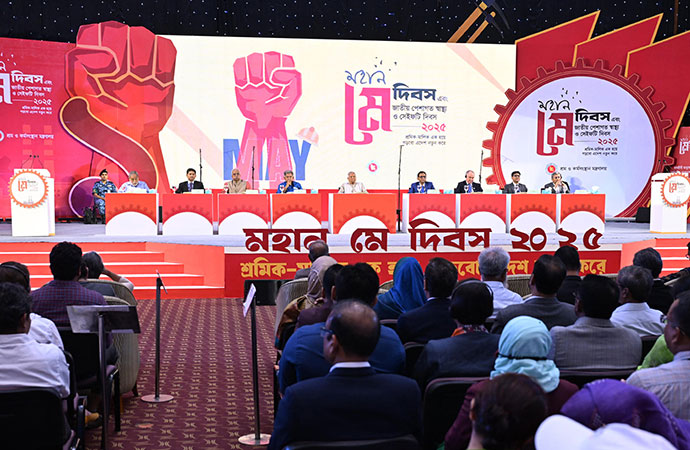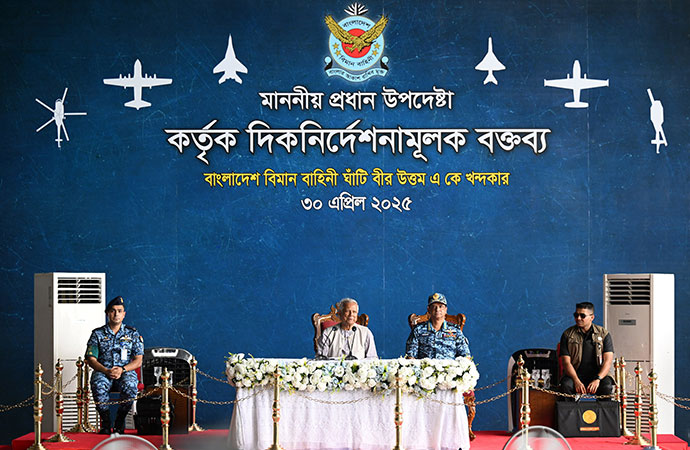Reportage

Photo: PID
Labour reform implementation key to starting a new journey, he says
Highlighting the importance of workers welfare through joint efforts, Chief Adviser Professor Muhammad Yunus on Thursday said the mass desire to build New Bangladesh would remain unfulfilled if the workers' conditions remain unchanged like the past.
"It's a shared responsibility (to ensure better conditions for workers) and it's a big opportunity for us," he said, emphasising on the implementations of the labour reform commission.
The Chief Adviser was addressing as the chief guest at a discussion marking the Great May Day 2025 and National Occupational Health and Safety Day at Bangladesh-China Friendship Conference Centre.
Referring to the Labour Reform Commission's report, Prof Yunus said he is personally very impressed to see the recommendations placed by the commission.
"Our responsibility is to begin the journey with the recommendations which can be implemented immediately," he said, adding that the implementation of recommendations will help create the solid base of the New Bangladesh.
Prof Yunus said they have started their journey in that direction and hoped that they will be successful.
The Chief Adviser said this year's May Day is totally different from the past occasions as there is a desire to build a new Bangladesh through July mass uprising.
Labour and Employment Adviser Brigadier General (Retd) Dr M Sakhawat Hussain, Labour and Employment Secretary AHM Shafiquzzaman, ILO Director General (recorded speech), ILO Country Director, Bangladesh, Department of Labour Director General, workers and employers' representatives, among others, spoke at the event. A documentary was also screened.
The Chief Adviser handed over cheques of financial assistance to workers and their families.
Prof Yunus expressed optimism that Bangladesh's development will gain further momentum through strengthened cooperation between workers and employers.
Safe and Fair Woking Environment
Professor Yunus emphasised that a country can only prosper when its workers operate in a safe and fair environment, and when employers genuinely value their labour.
Ensuring workers' welfare is not merely an act of goodwill, it is one of the essential conditions for industrial productivity, national growth, and economic development, he said.
The Chief Adviser said occupational health and a safe working environment are not just privileges but fundamental rights of workers, and ensuring them is a core responsibility of employers.
Highlighting the backbone of national progress, Prof Yunus said, "Behind the development of every sector in Bangladesh-be it garments, agriculture, industry, construction, transportation, or technology-lies the talent and hard work of both workers and employers."
To rebuild the nation, he stressed the need to create an environment of unity, mutual respect, and trust.
Driven by this determination, Prof Yunus called on everyone to join forces in protecting workers' rights, ensuring safe workplaces, and fostering constructive labor-management relations.
"If this trend of unity and cooperation continues," he said, "Then the dream of building a just and discrimination-free Bangladesh will become a reality."
Prof Yunus said continuous dialogue with workers and employers has significantly helped reduce labor unrest.
"In addition to protecting workers' rights, we must also ensure the sustainability of our industries," he said.
"In factories and institutions where dissatisfaction arose due to unpaid wages, we managed to keep operations running and maintain a stable work environment by resolving payment issues through negotiations," Prof Yunus added.
Recognising Bangladesh as a labor-intensive country, he stressed the importance of prioritizing workers' rights.
"We still have a long way to go. We must turn unskilled laborers into skilled workers through various training programmes," said the Chief Adviser.
To achieve this, he urged labor organisations, business leaders, investors, civil society, the media, and development partners to unite in protecting workers' interests and upholding fair labor practices.
"At the core of national progress are hardworking laborers and responsible employers," Prof Yunus said.
"We are committed to ensuring fair recognition and social protection for all workers," he said.
As a signatory to the International Labour Organization (ILO) conventions, Bangladesh is actively working to improve its labor standards in line with international benchmarks.
The country is currently implementing both a Roadmap with the ILO and a time-bound National Action Plan with the European Union.
"Ensuring a safe and healthy working environment is not only a workers' right-it is a prerequisite for industrial and economic advancement," Prof Yunus reiterated.
When workers' living standards improve, he said, the positive impact is felt across the entire industrial sector and national economy.

























Leave a Comment
Recent Posts
Have we freed the courts?
Years down the line, we may well look back on it as the interim govern ...
Will the proposed Dhaka Centra ...
The sun rises over the capital’s seven historic colleges, castin ...
A treasure-trove of ideas, forms, and colours
More than 156,000 expatriate Bangladeshis residing i ..
Roots in Rome, Heart in the Carpathians
The search for the missing Malaysia Airlines flight ..